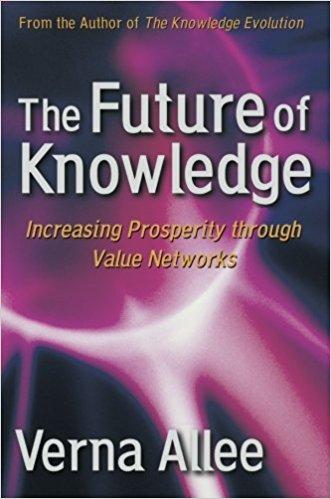Lucidea’s Lens: Knowledge Management Thought Leaders Part 9 – Verna Allee

Stan Garfield
 |
Verna Allee began her management career in 1975 as the co-founder of a networked sign manufacturing company. She organized the new company as a value network – a radical idea at the time. |
Within five years, the company was handling large installations from Alaska to Florida and revenue had grown to match some of the largest companies in the industry. Determined to carry her insights into global companies, she developed the ValueNetworks methodology, the cornerstone of ValueNetworks applications.
After a distinguished career in knowledge management and value networks, she retired in 2011. Although her personal website and much of her content is no longer accessible online, I retrieved it through The Wayback Machine of the Internet Archive and provide the links in this post.
Profiles
Posts and Articles
Presentations
- KMWorld
- SIKM Leaders Community: April 2007, Modeling Complexity with Value Network Analysis
Books
- Books and book chapters
- Value Networks and the True Nature of Collaboration with Oliver Schwabe
- The Knowledge Evolution: Expanding Organizational Intelligence
- The Future of Knowledge: Increasing Prosperity Through Value Networks

Table of Contents
Part I: The Shape of Things to Come
- Chapter 1 Introduction: The Center Keeps Moving
- Chapter 2 A New Prosperity
- Chapter 3 Evolution of Business Thinking
- Chapter 4 Living Networks
- Chapter 5 Learning into Complexity
Part II: Operational Enterprise Knowledge
- Chapter 6 Power and Limits of Technology
- Chapter 7 The Web of Knowledge
Part III: Tactical Approaches for Sense Making
- Chapter 8 Knowledge Networks and Learning Communities
- Chapter 9 Communal Learning and Beyond
Part IV: New Strategic Perspectives and Tools
- Chapter 10 The New World of Intangibles
- Chapter 11 Intangibles Go to Market
- Chapter 12 The Value Network Perspective
- Chapter 13 Value Network Examples
Part V: Principles for Prosperity
- Chapter 14 New Business Fundamentals
- Chapter 15 Reflections
Appendix: The Knowledge Complexity Archetype
Other Content
- Interviews and more
- Videos, podcasts, and webinars
- Value Networks
- Open Value Networks
- ValueNet Networks
- Association of Knowledgework Star Series – Preparing for Conversations
- April 2003 – Knowledge, Networks and Value Creation
- February 2006 – A Maxim a Day Keeps Disaster Away
12 Principles of Knowledge Management
- Knowledge is messy. Because knowledge is connected to everything else, you can’t isolate the knowledge aspect of anything neatly. In the knowledge universe, you can’t pay attention to just one factor.
- Knowledge is self-organizing. The self that knowledge organizes around is organizational or group identity and purpose.
- Knowledge seeks community. Knowledge wants to happen, just as life wants to happen. Both want to happen as community. Nothing illustrates this principle more than the Internet.
- Knowledge travels via language. Without a language to describe our experience, we can’t communicate what we know. Expanding organizational knowledge means that we must develop the languages we use to describe our work experience.
- The more you try to pin knowledge down, the more it slips away. It’s tempting to try to tie up knowledge as codified knowledge-documents, patents, libraries, databases, and so forth. But too much rigidity and formality regarding knowledge lead to the stultification of creativity.
- Looser is probably better. Highly adaptable systems look sloppy. The survival rate of diverse, decentralized systems is higher. That means we can waste resources and energy trying to control knowledge too tightly.
- There is no one solution. Knowledge is always changing. For the moment, the best approach to managing it is one that keeps things moving along while keeping options open.
- Knowledge doesn’t grow forever. Eventually, some knowledge is lost or dies, just as things in nature. Unlearning and letting go of old ways of thinking, even retiring whole blocks of knowledge, contribute to the vitality and evolution of knowledge.
- No one is in charge. Knowledge is a social process. That means no one person can take responsibility for collective knowledge.
- You can’t impose rules and systems. If knowledge is truly self-organizing, the most important way to advance it is to remove the barriers to self-organization. In a supportive environment, knowledge will take care of itself.
- There is no silver bullet. There is no single leverage point or best practice to advance knowledge. It must be supported at multiple levels and in a variety of ways.
- How you define knowledge determines how you manage it. The “knowledge question” can present itself many ways. For example, concern about the ownership of knowledge leads to acquiring codified knowledge that is protected by copyrights and patents.

Stan Garfield
Please enjoy Stan’s blog posts offering advice and insights drawn from many years as a KM practitioner. You may also want to download a copy of his book, Proven Practices for Implementing a Knowledge Management Program, from Lucidea Press. And learn about Lucidea’s Presto and SydneyEnterprise with KM capabilities to support successful knowledge curation and sharing.
Never miss another post. Subscribe today!
Similar Posts
Lucidea’s Lens: Knowledge Management Thought Leaders
Part 108 – George Siemens
In this edition of Lucidea’s Lens Stan Garfield profiles George Siemens—pioneering voice in connectivism and a driving force behind MOOCs and learning analytics—whose work continues to reshape how we understand learning knowledge creation and the role of technology in education and professional development.
Lucidea’s Lens: Knowledge Management Thought Leaders
Part 107 – Arthur Shelley
Explore Arthur Shelley’s insights on leadership co-creation and knowledge strategy through curated works that showcase his expertise in collaboration and innovation.
Lucidea’s Lens: Knowledge Management Thought Leaders Part 106 – Hubert Saint-Onge
As the creator of the Knowledge Assets Framework Hubert has shaped how businesses integrate strategy leadership and knowledge sharing to drive performance.
Lucidea’s Lens: Knowledge Management Thought Leaders
Part 105 – James Robertson
James Robertson is a pioneer in intranet strategy and digital workplace design helping organizations create seamless employee experiences. As the Founder of Step Two and a respected industry voice he has shaped best practices in content management portals and digital experience design.






Leave a Comment
Comments are reviewed and must adhere to our comments policy.
0 Comments